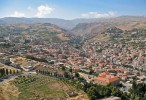From staff recruitment to retention and product retail to spa revenue, no issue was left untouched when Spa Manager united some of the UAE's leading spa experts.
What sort of training do spa managers require and what is available?
Russell: I think having been the spa manger without the training, I would certainly have benefited if I'd had more training. As a therapist, you're really isolated. It's a one-on-one relationship, so you don't actually have a lot of team-building skills, nor do you have the business acumen.
Antoniouk: To become a good spa manager you definitely need an experience and you gain this experience within the spa or recreation department. You have to be a therapist to be a good spa manager, because if you're not a therapist yourself and someone complains about a treatment, you will face the problem of how to deal with this.
Grew: I beg to differ on that one. I am a therapist and I have studied therapies, but my specialism is sports injury management, which has got nothing to do with the spa industry.
However, over the years I have worked alongside therapists and understand a little about therapists and their requirements. When I was a spa manager I had a good team of therapists that could assist me in that too.

| Advertisement |
I have more of a business background, and have been able to drive the business forward and create more of a professional environment.
I think five years ago everything was being geared towards a therapist becoming an assistant manager and then a manager; there needs to be a shift now because of the industry changing and becoming a much more professional industry.
There is a need to bring in business managers as opposed to therapists.
There is a lot that outside business experience can bring to spas and I think that needs to be the focus for the spa industry over the next five years.
It's changing from a spa to a business, and becoming a business leader within a hotel.
All the time that spa is seen as a secondary item to the hotel, it's never going to be anything more than that, whereas if we can change that cycle and create a more professional environment with structured career paths for everybody - from attendants right through to spa managers - then we will be able to drive the industry in a strengthened way and actually support our industry better.
Antoniouk: I agree with you, but it's easier if you understand the work from inside. I absolutely agree that a good manager with a business background who will know how to lead and motivate a team - somebody from food and beverage (F&B) or sales and marketing - can run the spa, but it will be more difficult for them if they don't have knowledge of anatomy and physiology.
Grew: I think there is a huge opportunity for business people from any walk of business to take on spas and actually start to lead them in a slightly different way and look at developing business trends and maximising profitability of spas.
Barcock: There's not a great deal of training available for spa managers.
The industry is now starting to move into this field - the International Spa Association (ISPA) and other contingencies are starting to develop courses - but if you really look at the industry as a whole everything is mainly geared up to the therapist, with CIBTAC and CIDESCO for example.
Historically, people haven't wanted to invest in training for spa managers generally because the retention can be quite low. People move on after a year, or maybe two years if you're lucky.
What are the specific challenges facing hotel spa managers?
Antoniouk: It depends how the GM looks at the spa. We are lucky because our gym and spa is not a secondary division; it's a profit-running department.









 Search our database of more than 2,700 industry companies
Search our database of more than 2,700 industry companies









